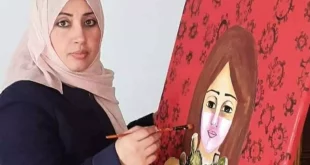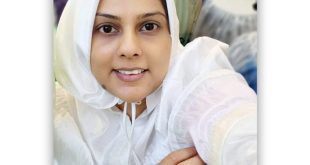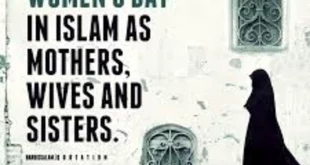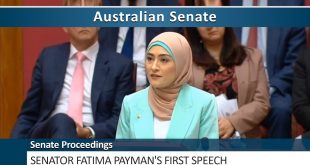
Zaiba Omar, left, and Hasna Maznavi, right, hang banners for the Women's Mosque of America’s first service this week. PHOTO: STUART PALLEY FOR THE WALL STREET JOURNAL
LOS ANGELES—When Hasna Maznavi would show up to pray at her Southern California mosque, even during off hours, the few men in the main hall would gently point her upstairs to a separate area for women.
“I started to feel unwelcome,” said the 29-year-old comedy writer and film-school graduate.
To Ms. Maznavi and fellow Muslim Sana Muttalib, a 31-year-old lawyer, the traditional separation was more than physical. Muslim women across the country, they believed, seemed disconnected from their scholarly heritage, and too few had leadership roles in their mosques.
So Ms. Maznavi and Ms. Muttalib decided to start their own mosque—one for women only.
On Friday, when they gather in Los Angeles for the first Friday prayer service at the new Women’s Mosque of America, worshippers won’t enter through a side door or have to sit in the rear. The call to prayer, traditionally performed by a man, will be given by a woman, as will the sermon.

Sana Muttalib, left, and Zaiba Omar in the Pico-Union Project while setting up for the Women's Mosque of America’s first service in Los Angeles on Thursday. PHOTO: STUART PALLEY FOR THE WALL STREET JOURNAL The women may also be making history. While female-only mosques exist in China, Islamic scholars and Muslim leaders here said they know of no other such mosque in the U.S.
“This is a hugely important, symbolic moment,” said Edina Lekovic, a 37-year-old Muslim activist from Pasadena who is giving the sermon. “It’s American Muslim women organizing and creating a space for their own spiritual nourishment by and for themselves.”
Some mosques draw on members of the lay community to lead prayer and give sermons, especially as American Muslims grapple with a shortage of trained imams. And it’s not uncommon for Muslim women to lead women in prayer in small, informal groups. But offering Friday prayers—the major service of the week—is a notable step.
Many younger Muslims raised in the U.S. are agitating for broader changes to mosques, or turning away from traditional mosques in favor of their own “third spaces.” This comes as more mosques are popping up to meet demand from the rising Muslim population in the U.S., and at a time when the community is under increasing scrutinyafter deadly terrorist attacks abroad linked to Islamic radicals.
The traditional separation of men and women, compounded by traditions carried over from immigrants’ home countries and the Islamic imperative for men to attend Friday prayers, has created a striking imbalance in American mosques, Muslim leaders, women and academics said.
According to study released in 2013 from the Islamic Society of North America, U.S. mosques reported attendance at Friday prayers on average was 18% female. Most mosques in the study scored fair or poor on a “women-friendly” scale.

Zaiba Omar, treasurer and board member at the Women's Mosque of America tapes down rolls of fabric for use in the mosque's first service this week. PHOTO: STUART PALLEY FOR THE WALL STREET JOURNAL“
The mosque will have to evolve to become more inclusive of women if it wants to remain relevant,” said Hind Makki, a 35-year-old Muslim woman in Chicago who consults with mosques on inclusion.
There is general agreement among various schools of Islamic thought that women can lead other women in daily prayers, said Jihad Turk, an imam and president of Bayan Claremont, the Islamic graduate school at Claremont School of Theology in Southern California. He noted there is precedent in Muslim history of female scholars and teachers, including the Prophet Muhammad’s wife, who led women in prayer.
But Islamic scholars are less in agreement over whether women can lead the special Friday prayer that is proceeded by a sermon. One solution might be to perform the regular daily prayer in addition to the Friday prayer to fulfill Islamic obligation, scholars suggested.
“This is something that has no precedent in history or tradition,” Muslim American scholar Furhan Zubairi wrote in a piece posted online Friday about the Women’s Mosque, referring to women leading the special Friday prayer. “The issue of precedence isn’t omething that should be taken lightly.”
But Mr. Zubairi said there is “nothing wrong with having a Women’s Mosque,” saying women should have “spaces where they feel safe, welcomed and respected.”
Mr. Turk said he has heard from a few conservative leaders who have expressed concerns over “whether this is somehow a slap to the face of the established community.” Some people, he added, “might take offense, and some are saying you should just work with the community [for change] instead of creating your own.”
Nearly two years ago, Ms. Makki launched Side Entrance, a website where Muslim women post photos of women’s entrances and worship space at mosques around the world. It began when Ms. Makki ducked into a mosque to pray and posted a photo of the cramped women’s area on her Facebook page. Her female friends commiserated, she said, but her “male friends were shocked. Most men don’t know where their sisters, wives or moms go to pray.”
The Pico-Union Project, where the Women's Mosque of America will hold its first services this week in Los Angeles. PHOTO: STUART PALLEY FOR THE WALL STREET JOURNAL She said she is hopeful the new women’s mosque will “bring this issue to the forefront. If women are feeling so excluded that they’ve created their own mosque, that shows you how desperate the situation is across the nation.”
For now, members of the Women’s Mosque will gather in a former synagogue that is now a multifaith center, in an industrial neighborhood just off downtown L.A. Its founders say it will serve as a “complement” to worshippers’ home mosques, not as a replacement. They hope to offer classes on the Quran, host female Islamic scholars and encourage women to take more active roles.
“This is a place where Muslim women can come and experience inspiration and then return with that to their communities,” Ms. Maznavi said. “We would love to not have to exist.”
Write to Tamara Audi at tammy.audi@wsj.com
 Sri lanka Muslims Web Portal Diversity and Inclusiveness
Sri lanka Muslims Web Portal Diversity and Inclusiveness



